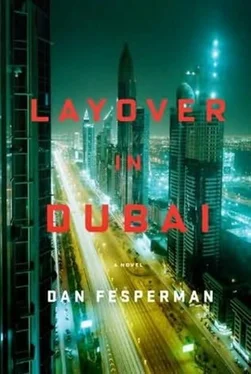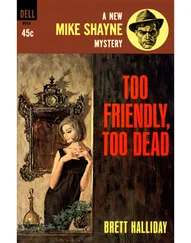“Maybe Charlie was a donor, too. Out of guilt, considering his track record. He did say something about atonement.”
“Or maybe this Basma was a favorite of his from a past visit, and he was tracking her down. The Tatiana woman could have been his contact. I can see how that might have upset the wrong people, especially if he was helping Basma stay free. Sending her money or something.”
“You really think that’s what happened?”
“That, or a hundred other possibilities. Whores are not the only women who end up at the Beacon of Light, or even wives. They take in housekeepers, maids, nannies. Which in Dubai are just milder forms of prostitution. Shady companies import them by the thousands on hali-wali visas.”
“What’s ‘hali-wali’ ?”
“A ‘who cares’ visa. Obtained from some dupe in a government office.”
“You mean like those fake ownership papers for Punjabi shopkeepers?”
Sharaf supposed the remark was intended to get a rise out of him.
“I’m guessing Laleh told you about that. But at least you are beginning to grasp the way things work here. Now if you could just tell me what these other scribbles in the datebook mean, you’d actually be contributing something worthy. Otherwise, all we have learned this evening is that, of the three names he listed, one is missing, one is dead, and one may or may not be staying at a place where women sometimes hide from their Mafia pimps. And the message of all that would seem to be pretty clear: If you are a friend of Charlie Hatcher’s, Dubai is not a very safe place.”
That was the thought Sharaf took to bed with him, and the one he awakened with as well. It was why he was now so relieved by Ali’s assurances of Sam Keller’s safety, which left him free to enjoy his coffee and their game of dominoes, while venting about his wayward sons.
“My sons,” he continued to Ali, “wouldn’t know how to handle a real estate transaction unless I did it for them. To them it’s a major crisis if their iPods crash. When those Internet service cables were severed on the ocean floor last summer I thought they were going to cry. You would have thought a ten-day sandstorm had just blown into town, followed by a plague of locusts.”
“Locusts,” Ali said. “Now there’s a memory. Remember that old man in the souk who used to fry them in a big kettle whenever a bunch of them blew in from the desert?”
“Yes. Very tasty. Until that year the British sprayed them all with poison, then went round the neighborhood with a bullhorn, telling us they were unsafe to eat.”
“The visitors always end up ruining things,” Ali said. “And if this speculation market ever comes to ruin, well, at least this time they’ll be burned even more than the locals. Because we will still have our salaries and our homes, while all their precious new buildings stand empty, collecting nothing but desert dust. By the way, Sharaf, did you happen to invite some of your police colleagues to come and visit us here this morning?”
Ali was looking toward the door, and Sharaf realized that the place had suddenly gone quiet. Old faces all around them were looking up from their card games toward the entrance. Sharaf turned to see what was happening as his last swallow of coffee settled into a muddy lump at the base of his stomach.
Three rank-and-file policemen stood just inside the doorway, led by a Sudanese sergeant in lettuce green-the very fellow who had handled a favor for Ali a few years back, even though he was known to have a steep asking price. The moment they spotted Sharaf they began moving in his direction, not even bothering to remove their shoes. A low murmur went up from the regulars. The scurrying waiters halted in their tracks.
Sharaf sat still, but his mind moved quickly. By now, Keller would be alone in the house, assuming the police hadn’t already picked him up. Laleh was at her office. Amina was visiting friends, and probably wouldn’t turn on her mobile phone until after lunch. He could tell Ali to phone the house, but Sam Keller might not have the nerve to answer.
“Call Laleh at her office,” he said under his breath. “Tell her what has happened. Find any way you can to get Keller out of the house immediately. And you’d better take him to one of those tougher locations you had in mind.”
“What about you?”
“Contact the Minister,” Sharaf said. “But unless you want to get me into even bigger trouble, don’t mention the American.”
The policemen arrived at his side. One gripped Sharaf’s right arm, another took his left, and they raised him to his feet. The sergeant spoke loudly enough for all to hear.
“You will hand over your phone, your keys, and your wallet and come with us, Lieutenant Sharaf. You are under arrest.”
“On what charge? Under whose orders?”
They said nothing in reply. Sharaf didn’t resist as they escorted him to the door.
A police car was outside, with a detention van idling behind it. Already a crowd was forming. A show of force like this was for more than just an arrest. It was designed to humiliate him. Even Lieutenant Assad probably couldn’t have rigged up this big of a display, and that suggested involvement at a higher level. This train of thought led Sharaf to the most chilling possibility of all-that the Minister himself, for whatever reason, was behind this.
An officer shoved Sharaf toward the van. He looked back toward the majlis and saw Ali standing at the entrance, grim faced.
“I’ll do what I can,” Ali called out.
Normally, such words from Ali meant the deed was as good as done. This time, to judge from his deepening frown, they both realized that the odds were against them.
As if to drive home the point, the officer produced a blindfold and roughly tied it into place. He then gripped Sharaf by the shoulders and shoved him through the van’s open panel doors, barking Sharaf’s shins on the rear bumper in the process. The doors slammed shut, and the agonized Sharaf was in darkness. The driver revved the engine once, then they careened away in a clatter of spraying gravel. Sharaf took a deep breath and held it until the pain in his shins subsided.
Between that and the darkness, it reminded him a little of diving for pearls in deep waters. Stay calm, he told himself. Relax and keep your eyes open. If further dangers arise, revel in them. Embrace them. But he had better keep holding his breath. He had a feeling he wouldn’t be coming up for air for quite a while.
Earlier that morning, Sam Keller awoke to an empty house. All was quiet. The window shades were drawn against the sunlight.
Sam had been dreaming of his father, and as he opened his eyes he still heard the voice from some of his earliest memories; the old man telling him to live a little, to give it a try, to go ahead and see what happened and let the chips fall where they may.
Flipping back the blinds onto a view of a scorched courtyard, Sam tried to pin down exactly when he had stopped heeding that advice. Or maybe he had never paid it much attention to begin with. Such words-on the surface, at least-had always seemed pat, even trite, the sort of pep talk that any father might offer.
But now, after having been in the workforce for five years, he recalled the gray face of resignation his dad had always worn when he came through the kitchen door every evening at six-or more often at nine during tax season-looking frayed at the edges as he cracked open an ice tray to mix the ritual daily pitcher of gimlets to be shared with Sam’s mom. Paul Keller had hated his job, Sam realized, now that he could recognize the symptoms. Accountancy had paid the bills and then some, and the technical side had probably come easily enough for a man with such a mathematical mind. But what stood out now was all of the little ways in which his father had tried to steer Sam in other directions, not least by teaching him to sail at the earliest possible age under all conceivable conditions, even when the wind was up and skies were aboil. As if, by seducing the boy with a few thrills, he might guide him toward a more exciting vocation.
Читать дальше












